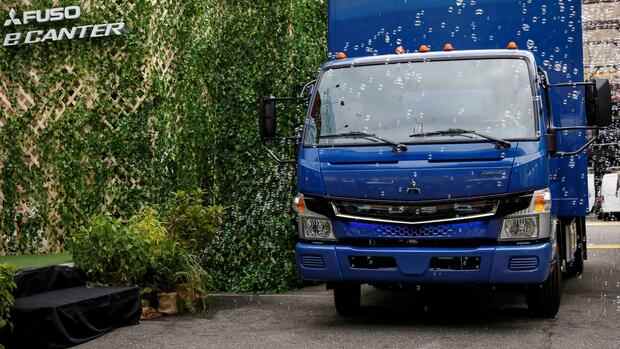Tokyo So far, Karl Deppen has only been able to manage the Asian division of Daimler Trucks remotely. In March, the Japanese government lifted an entry ban for foreigners that had lasted several months. But despite the initial difficulties, the manager’s first assessment is good: Daimler Truck Asia and its Japanese brand “Mitsubishi Fuso Trucks and Bus” were able to increase sales rapidly in the past fiscal year.
Overall, Daimler Truck Asia sold around 30 percent more commercial vehicles in Asia in 2021 than in the first year of the corona virus, in India it was even 45 percent and in Indonesia 72 percent more. If the delivery bottlenecks in semiconductors hadn’t slowed down production, even more trucks could have been delivered, Deppen said in an interview with the Handelsblatt.
Overall, Asia contributed almost a third to Daimler Trucks sales in 2021 with 143,000 vehicles sold. The share of sales was lower at 15 percent, since smaller trucks tend to be sold in Asia. With a profit margin of 7.2 percent, Daimler Truck Asia lies between the highly profitable USA business with brands such as Freightliner and Western Star and the core brand Mercedes, which focuses on Europe and which only had a 4.8 percent margin in 2021.
In Asia, the Fuso brand, which produces trucks for both highly developed Japan and developing countries in Asia, is considered the driving force, explains Deppen. “This definitely gives us a reach in the region that we couldn’t achieve to this extent with other brands,” says Deppen.
Top jobs of the day
Find the best jobs now and
be notified by email.
A strategic decision made around 20 years ago is paying off for the Group. When Daimler bought Mitsubishi Motors in 2000, the car analyst Koji Endo already pointed out that the Swabians were probably only interested in the profitable and strong Mitsubishi Fuso truck division. And he was right.
The new boss in Asia wants to expand further in the growth markets.
When the German car manufacturer withdrew from the Japanese acquisition Mitsubishi after five years, the profitable truck brand Fuso was retained. In the home market of Japan, the brand still stands up to its competitors Hino and Isuzu, both of which cooperate with Toyota. The Japanese business newspaper Nikkei even sees Fuso in the lead when it comes to environmentally friendly drives. “The switch to pure battery or hydrogen fleets will be the first by a major Japanese commercial vehicle manufacturer.”
Fuso was the first Japanese truck manufacturer to announce that it would stop selling diesel engines in the 2030s. Thanks to Fuso’s presence, Daimler Truck is even the market leader in Indonesia and Taiwan with market shares of 48 and 32 percent respectively.
The traditionally smaller and lighter trucks have long been prepared for electromobility and autonomous driving: Fuso is not only a competence center for light trucks like the Canter, explains Deppen, but also an important location where products for developing countries are developed.
Japan is a competence center of Daimler Truck
A state-of-the-art development center was inaugurated at the main plant in Kawasaki, Japan, even before the pandemic. There, engineers work virtually with their colleagues in Germany and America on the latest technology, which is then used worldwide by the various brands. “One of Daimler Truck’s strengths is that it can really use these economies of scale,” says Deppen.
The eCanter developed by Fuso was one of the first purely battery-powered small trucks in Japan and Europe. Its second version will follow this year, while the rivals are only just starting their own electric offensives. German, American and Japanese trucks can also share the technology for driving assistants.
>>Read here: Study: “The diesel is becoming obsolete” – Fleet managers swear by electric trucks
The development of high-precision road maps is also being promoted in Japan. They are intended to help the truck to brake in front of sharp curves or obstacles before they become visible to the driver. For forwarding agents, a forward-looking driving style can save fuel and thus money. Japan is already a leader in centimetre-accurate surveying of highways and main roads, and there are already several data and platform providers.
Fuso last year agreed to partner with Woven Alpha, a division of Toyota’s high-tech startup Woven Planet. Among other things, the technologists are developing a smart map platform that vehicles can automatically update with their sensors. “We see that as a great advantage for us,” says Deppen.
Fuso strengthens Daimler Trucks business in developing countries
In addition, Daimler benefits from Fuso’s experience in developing and emerging countries. It’s no longer just about the development of trucks that are cheaper and suitable for use on rough slopes, but also about climate-friendly drives.
It is true that many countries in the region are lagging far behind Europe or Japan in the transition to electromobility. “But many countries in Asia are catching up, some have even skipped emissions levels,” reports Deppen. Indonesia increased the regulations from Euro 2 to Euro 4 this year, India from Euro 4 to Euro 6.
Gas drives are used as bridge technology on the subcontinent. But especially in the chip stronghold of Taiwan or in Indonesian cities, the call for inexpensive battery-powered commercial vehicles is growing.
The current delivery problems and, above all, the sharp rise in raw material prices are also a burden on Asia’s truck manufacturers and their customers. Manufacturers are now passing on shrinking margins. Or as Deppen says: “We have already worked on pricing and will continue to do so.” The inflationary trend is omnipresent.
However, Asia remains one of the most important growth markets in the commercial vehicle business. “We can clearly see that Asia will be the growth region of the world in the next 10 to 20 years,” says Deppen, “and we want to be a part of it.”
More: Daimler Truck increases profit sevenfold and writes off its Russian business
